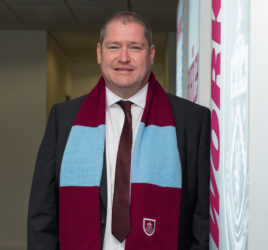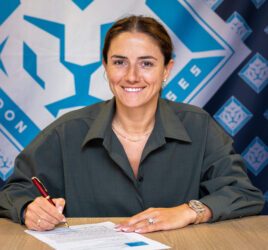524 days is how long England U19s coach, Lydia Bedford, has calculated since her group of young footballers had an international fixture. It is a large amount of time by any stretch, but particularly so in the cycle of youth football that prepares the next generation for their senior careers.
America in February 2020 seems like a distant memory these days. Indeed, so much has happened since, with the pandemic turning everyone’s world upside down. Following the cancellation of games in March, UEFA made the decision to postpone all international female youth competitions and it is only now, 18 months later, that they are starting to get going again.
Such an upheaval has thrown previous plans and ways of working out of the window. Players and coaches have had to adjust to ensure development continues and programmes are kept on track. In England, Bedford feels fortunate that camps were able to go ahead in the autumn with games against Championship sides, something that has not necessarily happened for other nations: “I think we’ve been really lucky as a national governing body that we’ve been in on camp. Lots of other countries, when we speak to their youth coaches, haven’t had as many opportunities with their players on the grass as we have…it’s probably been since January where it’s felt like we’ve taken the bigger hit, so we definitely had to think a little differently during the January to June period.”
During the first half of this year, camps for the under 18s and 19s went virtual, as well as all one-to-ones. This ensured that contact was maintained with players and their club around the England Individual Development plans. But while it presented its challenges, it has also forced national coaching staff to think outside the box and find new ways of working for the benefit of the players. In terms of camps going forward, some sessions (for example, nutrition workshops) will continue remotely to take the load off players when in camp. Connections with the clubs have also been strong to ensure national coaches get a close handle on where their players are at: “The clubs are so valuable for us in that because in those moments where we’re not seeing them, we know the clubs have got them on a weekly basis, and they hold the most knowledge possible. And we have to be able to tap into that to then support them best when they come into our environment.”
The main impact for the youth setup has been the amount of contact time with the players, delaying the arrival of some new faces until camps could re-start. The other struggle has been the social side of camps with chances to bond during downtime much more difficult due to the restrictions.
Bedford’s squad includes a broad mix of players. Some, like Olivia McLoughlin and Emily Murphy, broke through into the FAWSL last season and had some substantial playing time. Others have had less time on the grass, and, in season, the coaching staff have a balancing act in terms of management, both to protect the players but also to instil confidence in those who have had less minutes at club level: “Ultimately, sometimes we pick up the flack for that as in we can give them the minutes when the clubs can’t. Whilst they’re young players and they’re trying to break through still, we can provide them with playing time that maybe clubs aren’t able to because they’re competing for senior places.” However, this camp is essentially pre-season for everyone, levelling the playing field for all involved.
Bedford talks with immense pride about the development of her players. She has known this group since they were 15 and many have started to sign pro-contracts or play within the American University system. She views all the experiences they are getting as critical to the success of the U19s over the next 12 months as they learn how to deal with different situations within professional setups. It is all part of the parcel with the youth pathway system. Players have the chance to develop their football, certainly, but perhaps just as importantly, the coaches try to equip them with the skills off the pitch that they will need as they look to make the step into the senior set up: “I think for them to be a senior Lioness for us, their football ability is only going to be one part of that. Their maturity; their leadership skills; what type of person they are – are they someone who can be here for nine days and can deal with not playing or playing? Can they deal with the training load? Can they be a nice teammate? We’re trying to equip them with every skill they might need.”
The fact that that pathway is currently so visible to the younger players is also a huge help. This group of players have followed the journeys of the likes of Lauren Hemp and Georgia Stanway from the U20 World Cup just three years ago. Both are now representing Team GB at the Olympics and it offers real tangible and powerful motivation for those coming through.
So, what can we expect from the U19s this year? Well, this friendly is just the start as they wind up to European qualification this autumn, with the ultimate aim of reaching next summer’s U19 Euros in the Czech Republic. With the UEFA’s new format for the competition, Round 1 has certainly got tougher and England will face Northern Ireland, Republic of Ireland and Switzerland in their group as they try and chart a path through to the Finals. Bedford has plenty of faith in her squad’s quality that has “bags of talent” across the board, from calm defenders to lots of pace in wide areas. Their in-possession ability is strong while they will work hard for each other without the ball to recover and defend. It is all part of the FA’s new blueprint for how the national youth sides will play that aims for a style to develop right through from the under 15s to the under 20s.
But first up is the Czech Republic at AFC Telford today, a side who also have not played for the best part of a year and a half. They are a bit of an unknown quantity due to the lack of footage England’s coaches have been able to get but the young Lionesses will be trying a new system – 3-4-3 – and Bedford will be looking for the adaptability and tactical understanding of her players to react to the situations in front of them. But most of all, it is just the excitement to be back on the international stage. As Bedford states, there really is nothing quite like it: “It gives me goosebumps thinking about it. It’s going to be a really proud moment to see them on the pitch tomorrow and I really hope that they just enjoy every moment of it…I think any England game, pulling on the shirt is a proud moment and being on the touchline as a coach is definitely one for me.”



